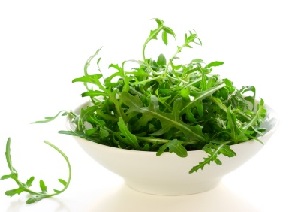Lose Weight
![]() Calories in Food
Calories in Food
![]() Calories in Vegetables
Calories in Vegetables
![]() Calories in Arugula
Calories in Arugula
Calories in Arugula or Rocket Salad, Nutrition and Health Benefits
How many calories in Arugula? See below, the Arugula calories for the different serving sizes. Arugula is a green leafed salad plant sometimes known as Garden Rocket or simply Rocket, Roquette, or Eruca. We provide you with Arugula nutrition facts and the Arugula benefits to help you lose weight and eat a healthy diet.
It is very low in calories but full of vitamins and minerals, including vitamins A, C, K, beta carotene, folate (or folic acid), lutein, calcium, potassium, magnesium and phosphorus as well as several others.
It is well known for its aphrodisiac qualities. Given its high lutein and beta carotene content it is thought to add protection against macular degeneration and cancer. Other health benefits of Arugula include an improved immune system.

See our vegetable calories comparison chart to compare calories in Arugula with the other calories in vegetables.
Also, have a look how nutritious Arugula is in comparison to the other vegetable nutrition facts.
Calories in Arugula, Raw
Refuse: 40% (Roots, stems and yellowed leaves)Scientific Name: Eruca sativa
| Serving Size | Calories per Serving |
| 100 grams | 25 kcal (105 kJ) |
| 1 leaf, 2 grams | 0 kcal (2 kJ) |
| 0.5 cup, 10 grams | 2 kcal (10 kJ) |
Arugula or Rocket Salad Nutrition Facts
| Nutritional value per 100 g (3.5 oz) | |
|---|---|
| Proximates: | |
| Water | 91.71 g |
| Energy | 105 kJ (25 kcal) |
| Carbohydrates | 3.65 g |
| Fiber | 1.6 g |
| Sugars | 2.05 g |
| Total Fat: | 0.66 g |
| Cholesterol | 0 mg |
| Protein | 1.23 g |
| Minerals: | |
| Calcium, Ca | 160 mg (16 %) |
| Iron, Fe | 1.46 mg (8 %) |
| Magnesium, Mg | 0.321 mg (16 %) |
| Phosphorus, P | 52 mg (5 %) |
| Potassium, K | 369 mg (8 %) |
| Zinc, Zn | 0.47 mg (3 %) |
| Copper, Cu | 0.076 mg (4 %) |
| Manganese, Mn | 0.321 mg (16 %) |
| Selenium, Se | 0.3 mcg (0 %) |
| Vitamins: | |
| Vitamin C | 15 mg (25 %) |
| Thiamine (Vit. B1) | 0.044 mg (3 %) |
| Riboflavin (Vit. B2) | 0.086 mg (5 %) |
| Niacin (Vit. B3) | 0.305 mg (1.5 %) |
| Pantothenic acid (B5) | 0.437 mg (4 %) |
| Vitamin B6 | 0.073 mg (4 %) |
| Folate (Vit. B9) | 97 mcg (24 %) |
| Vitamin B12 | 0 mcg (0 %) |
| Vitamin A | 2373 IU (47 %) |
| Vitamin E | 0.43 mg (2 %) |
| Vitamin K | 108.6 mcg (136 %) |
| Percentages are relative to US Recommended Daily Intake (RDI) for adults. | |
Author: Lana Soko
You Might Also Like:
Like This Page?
|
Share This Page:
|







